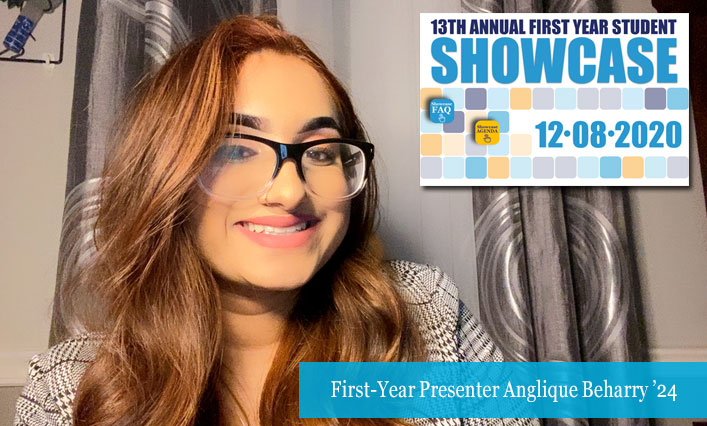
Every fall semester the John Jay community looks forward to seeing first-year students present their semester-long research projects at our annual First-Year Student Showcase. The variety of topics tends to be wide, the methodology for researching the subjects can be intriguing, and the faculty and staff mentorship for our first-year students is always inspiring. Not being able to gather on campus would seem to be a stumbling block for holding the 13th Annual First-Year Student Showcase—as we’d normally peruse hundreds of poster board presentations in the halls of John Jay—but that didn’t stop our students, who were guided by the incomparable Nancy Yang, Associate Director of First Year Programs, who managed our first-ever virtual First-Year Student Showcase.
“While the showcase looks different from years past, this showcase is probably going to be the one that I never forget,” said Yang during the virtual event. “It’s the one where first-year students started their college experience in the middle of a pandemic and found ways to collaborate with each other without ever being physically together. It’s the one where faculty showed their love and support through a screen.” After watching the first-year student presenters mention what they researched over the semester, many viewers wanted a more in-depth look at their projects. That’s where this article series comes in. We connected with some of the presenters and dived a little deeper into their theories, their methodologies, and their findings.
With the help of Assistant Professor Gregory “Fritz” Umbach, Ph.D., Lecturer Elton Beckett, Assistant Professor Valerie West, Ph.D., and Peer Success Coach Tatyana Robinson, Anglique Beharry ’24, an International Criminal Justice major who grew up in South Ozone Park, New York, delved into the career paths of New York Police Department (NYPD) officers accused of misconduct. We were interested in learning more about the research she conducted with her team.
What was your original research hypothesis?
For the preliminary research of our study—which was titled “Exporting Bad Apples: Locating Former NYPD Officers Accused of Misconduct”—we wanted to see whether NYPD officers accused of misconduct left their position in the NYPD and got employment in law enforcement elsewhere. My team and I hypothesized that we wouldn’t find many “hits” on NYPD officers becoming employed at other law enforcement agencies, which meant that they either stayed in their jobs at the NYPD or got work in another career field.
What specific methodology did you use to conduct your research?
To find officers who were accused of misconduct, we used the “MISC” file in the Civilian Complaint Review Board (CCRB) database where all complaints against officers can be found. We wanted to find the closed cases. Then, we used New York, New Jersey, and Connecticut state databases that included information on current and past employment of officers to see if they left the NYPD and found employment in law enforcement elsewhere. If we found a name, we looked at the dates the allegation was filed. The dates were a form of confirmation that it was the correct individual. Another source that we used was CAPstat, which is a website where you can enter an officer’s name and find basic information, like their start date and the date their employment ceased. When we confirmed that we found a “hit,” that simply meant the officer found employment in another law enforcement agency.
“I don’t like giving up and I started this project with the intention of learning and acquiring new knowledge despite any obstacles that occurred.” —Anglique Beharry
During your research did you encounter any specific obstacles?
Some obstacles that my team and I faced was finding hits in the correct form. At first when finding the hits, we thought if accused NYPD officers still showed up in the state employment database that would count as a hit. Eventually when we sent the project in with the hits, Professor Umbach helped us realize that there was an error in our analysis. Two days before the Showcase deadline we had the option to drop the project or pull it together and start over. Personally, I don’t like giving up and I started this project with the intention of learning and acquiring new knowledge despite any obstacles that occurred. Because of the 48-hour deadline, we lost a few of our team members. However, my team member Aviana Shaw and I were determined to pull through. We examined one-third of the data from the MISC file and ran the names through the New York, New Jersey, and Connecticut databases to determine if the individuals who were employed by NYPD, left and found employment in law enforcement elsewhere. Knowing there was a deadline we were very stressed. But we were able to finish on time.
When the research concluded, what were some of your conclusions?
Based on our analysis of the database information, my team and I concluded that NYPD officers didn’t have many hits. This is because most officers were still working in the NYPD or left for jobs outside of the law enforcement field. When inputting names, some officers didn’t even show up in the database, which could mean that they took jobs that weren’t being recorded in the state databases. This further supports our hypothesis that we wouldn’t find many hits on the accused individuals.
“If a law enforcement officer has done something wrong and violated the terms of his or her job, there needs to be justice for the people that have been harmed.” — Anglique Beharry
After doing the research that you’ve done, what advice would you give to different law enforcement agencies hoping to make better connections with the communities that they serve?
Some advice that I would give to law enforcement agencies would revolve around the relationship that they have with the communities that they’re serving. My suggestion would be to have patience, empathy, and be mindful. Empathy is the most important skill to have as a law enforcement worker. The ability to understand and put yourself in the shoes of others is the most helpful skill when communicating with civilians. Also, law enforcement officials in the NYPD should be mindful when taking action against civilians. Repercussions are a serious matter and exist for a reason. If a law enforcement officer has done something wrong and violated the terms of his or her job, there needs to be justice for the people that have been harmed.
“Throughout the project there were many obstacles, but in the end, I learned that things go wrong in real life. Nothing is ever set and stone.” —Anglique Beharry
What surprised you the most about this experience?
Many things surprised me about the experience, but the thing that surprised me the most was my work ethic and strength even when I felt like giving up. Throughout the project there were many obstacles, but in the end, I learned that things go wrong in real life. Nothing is ever set and stone. It was my team’s ability to accept the reality of the situation that made the project turn out as successful as it did.



